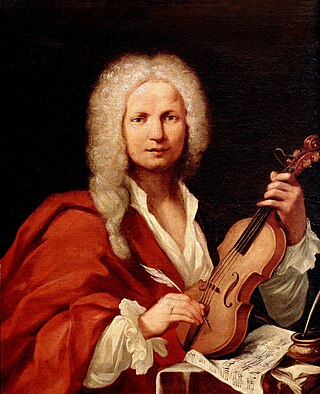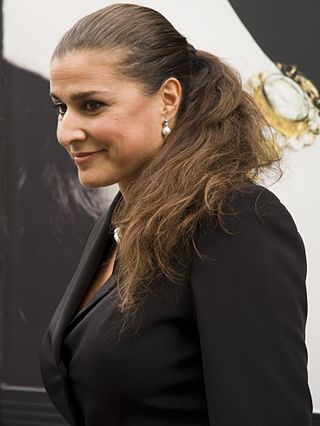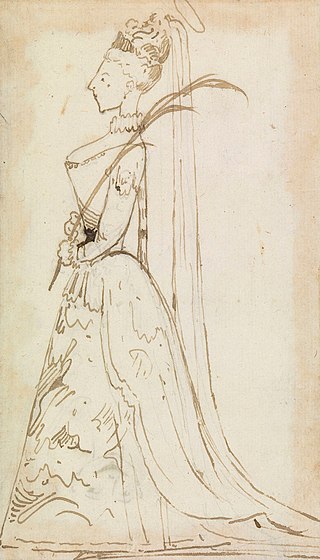Related Research Articles

Antonio Lucio Vivaldi was an Italian composer, virtuoso violinist and impresario of Baroque music. Along with Johann Sebastian Bach and George Frideric Handel, Vivaldi ranks amongst the greatest Baroque composers and his influence during his lifetime was widespread across Europe, giving origin to many imitators and admirers. He pioneered many developments in orchestration, violin technique and programmatic music. He consolidated the emerging concerto form into a widely accepted and followed idiom.

Cecilia BartoliOMRI is an Italian coloratura mezzo-soprano opera singer and recitalist. She is best known for her interpretations of the music of Bellini, Handel, Mozart, Rossini and Vivaldi, as well as for her performances of lesser-known music from the Baroque and Classical period. She is known for singing both soprano and mezzo roles.
This is a list of notable events in music that took place in the year 1735.

Pulcinella is a 21-section ballet by Igor Stravinsky with arias for soprano, tenor and bass vocal soloists, and two sung trios. It is based on the 18th-century play Quatre Polichinelles semblables, or Four similar Pulcinellas, revolving around a stock character from commedia dell'arte. The work premiered at the Paris Opera on 15 May 1920 under the baton of Ernest Ansermet. The central dancer, Léonide Massine, created both the libretto and the choreography, while Pablo Picasso designed the costumes and sets. The ballet was commissioned by Sergei Diaghilev, impresario of the Ballets Russes. A complete performance takes 35–40 minutes. Stravinsky revised the score in 1965.
In music, a pasticcio or pastiche is an opera or other musical work composed of works by different composers who may or may not have been working together, or an adaptation or localization of an existing work that is loose, unauthorized, or inauthentic.
"Amour Fou" is the 38th episode of the HBO original series The Sopranos and the 12th of the show's third season. Its teleplay was written by Frank Renzulli from a story idea by series creator, David Chase. It was directed by Tim Van Patten and originally aired on May 13, 2001.

Giove in Argo is an Italian opera by George Frideric Handel. It is one of Handel's three pasticcio works made up of music and arias from his previous operas. The libretto was written by Antonio Maria Lucchini. The opera was first performed at the King's Theatre, Haymarket, London, on 1 May 1739.

Bajazet is an Italian opera in 3 acts composed by Antonio Vivaldi in 1735. Its libretto was written by Agostino Piovene. It was premiered in Verona, during the Carnival season of that year. It includes a three-movement sinfonia as an introduction. The story is about the fate of Bajazet after being captured by Tamerlane. The famous aria "Sposa son disprezzata" is from this opera.
Alessandro Parisotti was an Italian composer and music editor.

Argippo is an opera libretto by Domenico Lalli, which in Giovanni Porta's setting premiered in Venice in 1717. Claudio Nicola Stampa's reworked version of the libretto was set as L'Argippo by Andrea Stefano Fiorè. This opera was performed in Milan in 1722.
"Sebben, crudele" is an aria from Antonio Caldara's 1710 opera, La costanza in amor vince l'inganno. It comes from the third scene of the opera's first act, and is sung by the character Aminta, a nobleman whose wife is unfaithful.

Catone in Utica is an opera libretto by Metastasio, that was originally written for Leonardo Vinci's 1727 opera. Following Vinci's success, Metastasio's text was used by numerous composers of the baroque and classical eras for their own operas, including Pietro Torri (1736), Antonio Vivaldi (1737), Giovanni Battista Ferrandini (1753) and J. C. Bach (1761).

Geminiano Giacomelli was an Italian composer.

L'amore innocente composed by Antonio Salieri (1750–1825), is an Italian-language opera in two acts. Stylistically, it is a pastoral opera and is very similar to the mid-18th-century Roman Intermezzo. The libretto was written by Giovanni Gastone Boccherini, dancer, poet and stage manager, brother of the composer Luigi Boccherini.
"Se tu della mia morte" is an aria from act 3 of Alessandro Scarlatti's 1697 opera La caduta de' decemviri to a libretto by Silvio Stampiglia.

L'honestà negli amori is a dramma per musica in 3 acts by composer Alessandro Scarlatti. Written in 1679-1680 when Scarlatti was 19 years old, it was his second opera. The opera uses an Italian language libretto that was written by either D F Bernini or Domenico Filippo Contini. The work premiered at the Teatro di Palazzo Bernini in Rome on 3 February 1680. The opera was performed again in 1682 in Acquaviva delle Fonti at the Palazzo De Mari with Acquaviva laureata a serenata composed by Giovanni Cesare Netti. The opera has since been almost entirely forgotten, except as the source of the aria ‘Già il sola dal Gange’.
La Merope is an opera seria in three acts by Geminiano Giacomelli with a libretto by Apostolo Zeno. It was dedicated to Karl August, Prince of Waldeck and Pyrmont. It was first performed in 1734 at the Teatro Grimani di San Giovanni Grisostomo in Venice. The stage designer was Alessandro Mauro, the costume designer was Natale Canciani and the choreographer was Francesco Aquilante.

L'Olimpiade is an opera in the form of a dramma per musica in three acts by the Italian composer Giovanni Battista Pergolesi. Pergolesi took the text, with a few modifications, from the libretto of the same name by Pietro Metastasio. The opera first appeared during the Carnival season of 1735 at the Teatro Tordinona in Rome and "came to be probably the most admired" of the more than 50 musical settings of Metastasio’s drama.

La Rosmira fedele, also known in modern revivals as Partenope, is a 1725 opera by Leonardo Vinci. It is largely based on Domenico Sarro's 1707 setting of Silvio Stampiglia's libretto Partenope but with new arias by Vinci. It was premiered 31 January with Antonia Merighi as Queen Partenope and Faustina Bordoni as Rosmira. Vivaldi set Stampiglia's libretto as a pasticcio Rosmira Fedele in 1738 using arias by Handel, Hasse, Pergolesi, and minor local Venetian composers.

Maria Giustina Turcotti, sometimes shortened to Giustina Turcotti, was an Italian vocalist who had a career in opera. Sources vary in describing her voice type, some identifying her as a soprano and others a mezzo-soprano. She performed in opera houses in Italy from 1717 through 1746, and then toured Europe as a member of Pietro Mingotti's opera troupe from 1746 to 1750. She was a resident singer at the Bayreuth court opera; a position she held from 1750 until 1758 and then again from 1760 through 1763. After this period no record of the singer has been found.
References
- Groves Music Online (subscription required)
- Sposa son disprezzata libretto
- Who composed "Sposa son disprezzata"?